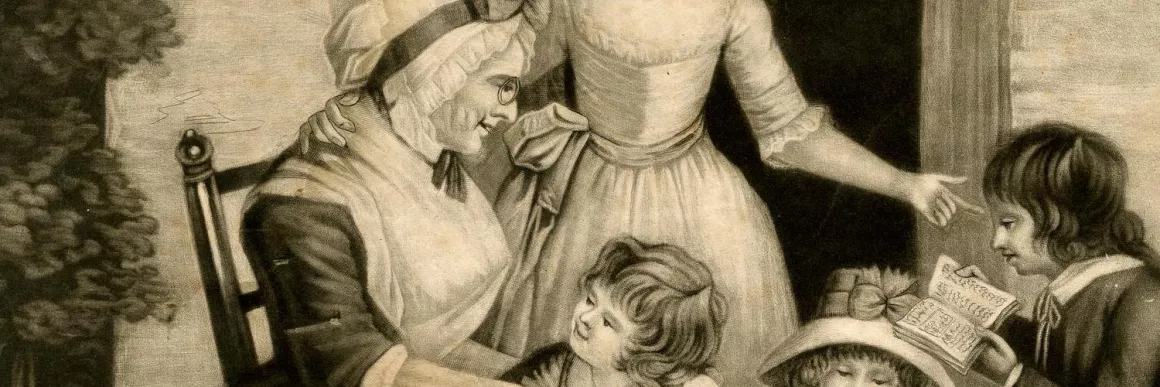© The Trustees of the British Museum. Shared under a Creative Commons Attribution-NonCommercial-ShareAlike 4.0 International (CC BY-NC-SA 4.0) licence.
The Romantic era witnessed broad experimentation with and theorization of education at all levels, from efforts to make education available to child laborers to ideas about the role of nature in learning. Our own period is experiencing similarly intense debates about the best means of educating students in a rapidly expanding world. Romantic Education: Romantic Pedagogies and New Approaches to Teaching Romanticism theorizes Romantic-era theories and practices of teaching and learning, as well as pedagogical approaches to the teaching of Romanticism in the modern classroom.
Abstract
This collection combines studies of pedagogical history in the late eighteenth and early nineteenth century with discourses about innovations taking place in today’s classrooms. By including essays on both topics, we hope to expose the breadth and richness of educational debates in Romanticism, to shed light on new ways to teach Romantic texts, and, finally, to encourage readers to find links between—and potentially answers to—the pedagogical problems facing educators both today and two hundred years ago.
Abstract
This article examines the connection between Tom Wedgwood’s pedagogical theories and his materialist theories of mind, which emphasized the importance of emotion in character formation. Wedgwood hoped to open an experimental school for infants with the goal of producing a generation of politically radical geniuses. This article situates Wedgwood’s ideas within the context of Romantic theories of cognition, debates about the mind-body relationship, and social reform, and points to a growing trend that connected bodily health and moral virtue.
Generic Mutability and the Pedagogy of Realism in Charlotte Smith’s The Romance of Real Life and Mary Wollstonecraft’s Original Stories from Real Life
Suzanne L. BarnettAbstract
This paper investigates the didactic and pedagogic values of Romantic realism by looking at the ways in which Wollstonecraft and Smith, in particular, experiment with the synthesis of Romance and history and how these experiments form the core of their pedagogical projects undertaken within the growing genre of children’s prose. Wollstonecraft’s and Smith’s productions for young readers address the anxiety about women’s ability to employ historical fact and realism in serious literature and replace women’s “state of perpetual childhood” with the powerful roles of educator and arbitrator.
Abstract
Byron´s engagement with Romantic discourses of education in his closet drama Cain has been overshadowed by critical discussions of the work´s theology. This essay repositions Cain within period debates about the goals and possibilities of pursuing knowledge. Falke suggests that although Cain appears to endorse the epistemology implied in many discussions of elite education, it ultimately undermines the dichotomies of knowledge vs. action and mind vs. body upon which these discussions relied.
Universal Truths, Unacknowledged Legislators: Teaching the First Sentence of Pride and Prejudice
Chris WashingtonAbstract
The following essay replays a close-reading, word-by-word in-class exercise of Pride and Prejudice's opening sentence: "It is a truth universally acknowledged that single men in possession of good fortunate must be in want of a wife." In our close reading students and I explore how, in Austen's hands, her famed use of free indirect discourse and irony deflate transcendental assumptions about gender and class.
Abstract
This essay chronicles my experience teaching a course outside of the realm of Romanticism (a first-year writing course focused on digital media), an experience which occasioned reflection on the lessons that Romanticism can offer us about contemporary new media, and in particular how we approach new media pedagogically. The essay begins with an overview of new media scholarship which seeks to redress the tendency to view new media as always immaterial, the scholarship that informed much of the focus of the course in question.
Abstract
The design of this course is to introduce students to the influence that Digital Humanities is having on our organization of the study of Romanticism. To that end, the course shifts from the traditional survey of major authors, to a survey of Romantic-era publishers, whose publications have only recently become widely available through digitization. While there are opportunities for the close reading of major Romantic texts authored by these publishers, emphasis is placed in the assignments on distant reading of periodicals.
Playing with Independence: Using Multiplayer Online Narratives to Explore Independent and Interdependent Tensions in Romantic-Period Literature
Jon SaklofskeAbstract
This paper discusses the outcomes of a multi-year project to engage undergraduate students in active and constructive encounters with Romantic period themes and contexts via web-based, multi-user gamespaces. Interactive, participatory learning environments, akin to humanities “lab” spaces where controlled experimentation and exploration can take place, encourage students to innovate, create, share, and play together.

